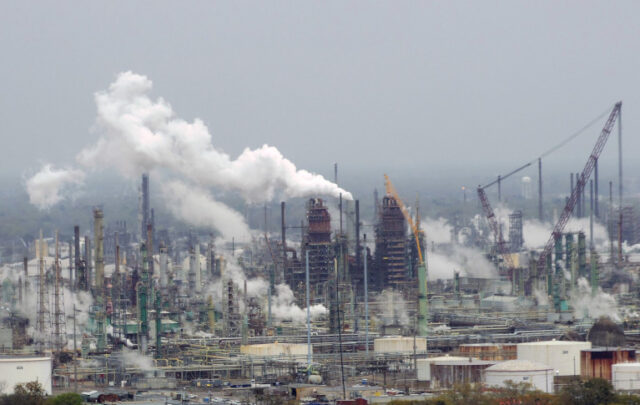Click on the headline (link) for the full text.
Many more articles are available through the Energy Bulletin homepage
King Abdullah’s First Year: A Personal Perspective
John Duke Anthony, Saudi-U.S. Relations Information Service (SUSRIS)
The period since King Abdullah’s accession to the position of Custodian of the Two Holy Places has been one of significant change.
PIQUED BY “PEAK OIL?”
… Beyond the uncertain longer-term results of elevated Chinese and Indian demand for Saudi Arabia’s and other Gulf countries’ fuel deposits, there are additional considerations that investment analysts, bankers, and energy consultants will want to ponder. Market predictions for oil and gas, for example, are confounded to some degree by articles focusing on the future of Saudi Arabia’s energy resources. Of particular concern is the intermittent public fascination with the topic of “peak oil” — this is in spite of the fact that many specialists believe that the earlier sustained public interest in peak oil has itself begun to show signs of peaking.
Some banking and financial publications have caused a stir by hyping the fear that Saudi Arabia’s production will peak years sooner than expected. A few maintain that world reserves peaked as of 2005. Such alarmist reporting has helped sow a degree of doubt among energy planners. No such lack of confidence was evident, let alone as publicly obvious or widely discussed, in years past. Earlier unchallenged views that Arabia and the Gulf would be the main source of world oil supplies, and that Saudi Arabia would definitely be the premier source for the indefinite future, have been, if not exactly shaken, then at least nudged.
Lost in the swirl of controversy surrounding this new analysis by some people of world energy dynamics is that few publications have noted that the accompanying scare was originally the result of writings by Matthew Simmons. The latter has been and remains a controversial source. Simmons’ analytical credentials, if not also his prognostic ones as well, are considered by many to be dubious given that he has long been an American investment banker based in Houston, Texas.
Even now, relatively few people outside the publications and conferences where Simmons has argued this case would have known the frequency with which his contentions have been soundly rebutted by geologists, petroleum engineers, and oil reservoir technical specialists. These quite differently situated individuals and specialists, almost all of whom have had decades of firsthand experience working with the oil fields in question and whose work has required that they carefully monitor and report on such matters every day, all year round, continue to contest and argue the exact opposite of the “peak” oil theorists.
DR. JOHN DUKE ANTHONY is the founding president and chief executive officer of the National Council on U.S.-Arab Relations. Based in Washington, D.C. and established in 1983, the Council is a nonprofit and nongovernmental educational organization that administers programs to increase American awareness of U.S. interests and involvement in the Arab countries, the Mideast, and the Islamic world.
(1 Aug 2006)
A surprising amount of coverage is given to peak oil in this long article, which seems to reflect the official Saudi viewpoint.
Pemex Says Cantarell 2006 Production to Decline 8%
Thomas Black, Bloomberg.
Petroleos Mexicanos, Mexico’s state- owned oil monopoly, said production at its Cantarell oil field, the world’s second-largest by volume, will decline 8 percent in 2006, dropping faster than its December estimate of a 6 percent.
Cantarell will produce 1.86 million barrels of crude a day in 2006, Vinicio Suro, deputy director of planning and evaluation for Pemex’s production and exploration unit, said in a conference call with analysts. Pemex in December said the field, which accounted for 57 percent of Mexican crude output in the first half of this year, would produce 1.9 million barrels per day in 2006 compared with 2.03 million barrels a day in 2005.
“The slides that they’re starting to see out of Cantarell must have a lot of people stressed at Pemex,” said John Padilla, director of IPD Latin America, an energy consulting firm with offices in Mexico City, Caracas and New York.
Pemex, the world’s third-largest oil company by crude production, hasn’t spent enough to develop deep-water deposits or the fractured oil pockets onshore that could eventually replace production at Cantarell because the state-run company doesn’t plan much beyond the presidents’ six-year term, Padilla said. Pemex accounts for about 40 percent of government revenue.
With efforts to stem Cantarell’s decline and to boost output at peripheral fields, daily production at the company may decline to less than 2.8 million barrels by 2010 and 2.5 million barrels by 2012, Padilla said.
“Our bigger concern starts in about 2008,” Padilla said.
(2 Aug 2006)
Related: When Mexico runs dry
Sacramento Bee
Mexico’s economy and government are living on borrowed time, and the day of reckoning may be coming sooner rather than later. A third of the country’s federal revenues come from the profits from government-run oil fields.
Etopia News: interviews with Randy White, Dr. David Goodstein and Dan Bednatz
Marc Strassman, Peak Oil/Global Warming Channel
- Randy White, member of Portland Peak Oil and the City of Portland Peak Oil Task Force
Randy White sells ads for AM620-KPOJ, “Portland’s Progressive Talk Station;” belongs to Portland Peak Oil; and is a member of the Portland Peak Oil Task Force, a panel assigned by a May 10, 2006 city resolution to study the issue of peak oil; seek community input on the issue; prepare recommendations for action, and propose an appropriate public education program. - Dan Bednarz calls for the creation of “Energy & Health Centers” to address effects of peak oil on public health and health care
Dan Bednarz, Ph.D., is a former Associate Director, Center for Public Health Practice, University of Pittsburgh Graduate School of Public Health (until 2005) and is now President of Energy & Health Care Consultants. He is trying to focus the attention of the public health community, and especially schools of public health, on what he sees as the potential catastrophic effects of “peak oil” on public health and the delivery of health care services in a country woefully unprepared for the coming crisis.
Dr. Goodstein’s “Out of Gas: The End of the Age of Oil” (Audio)
On June 12, 2004, Dr. Goodstein’s original audio interview was featured as part of an Oil World article entitled “‘Out of Gas’ as a book and as a news story (later, as reality).”
(2 Aug 2006)
The Peak Oil/Global Warming Channel is ‘an innovative and growing online broadband television distribution platform.’
Are we on the plateau?
EnergiKrise.blogspot.com
Note: original article is in Norwegian. Comments are ours. -AF

Bill Tamblyn has made a similar graph to which he comments:
To date the peak month was December 2005 and the peak in the 12-month moving average was March 2006. Time will tell whether or not this is the start of something big.
EnergiKrise have also published the following graph of Natural Gas Liquids production:

(1 Aug 2006)
An end to subsidized parking
Chris Rall, The Arcata Eye
The people of Arcata remember back 10 years ago to 2006 when gas steadily climbed past $3 per gallon and wonder how they ended up saddled with this mess. Few people drive anymore, and yet so much of our land that we need for housing ourselves and growing food is taken up by pavement.
Sounds like paranoid fantasy? May I suggest reading up a little on the concept of Peak Oil? With gas going over $3 a gallon for good and parking at HSU set to jump to almost $160 per semester in two years, the twilight of our easy-motoring lifestyle is starting to show a little more clearly.
Yet our road infrastructure is over-built even for the amount we use it today. Look around you at most times of day and you see wide empty streets and plentiful parking in most parts of town at most times of day. This is kind of nice for motorists, except the City can’t afford to repave streets. Many back streets and even some major streets are deteriorating rapidly, and the when the city gets around to repaving, it only repaves the middle of the street, leaving the sides to continue crumbling. It has become apparent that we have too much pavement for our own economic good.
(1 Aug 2006)
2006 Boston World Oil Conference
Time for Action: A Midnight Ride for Peak Oil
Co-Hosted by ASPO-USA and Boston University
ASPO-USA announces our second “Dialogue with the Experts,” a high-level conference to discuss the impacts of and responses to a peak in world oil production. Take “A Midnight Ride for Peak Oil” with us as you consider appropriate action. Our conference speakers will provide the most current available information about the evolving peak oil challenge. We’ll continue to address key gaps in essential information, and expand our individual and collective focus towards intelligent responses.
Our speakers include Matt Simmons, Ali Samsam Bakhtiari, Arthur Smith, Roger Bezdek, James Bartis, Steve Alten, Richard Heinberg, Dan Schrag, Dick Lawrence, Cutler Cleveland, Robert Kaufman, David Hughes, Jim Gordon, Jeremy Gilbert, John Heywood, William Clark, Stuart Staniford, Tom Whipple, Mike Rodgers, Milton Maciel, Bill Reinert, Ezra Hausman, Michael Klare, James Hunt III, Jim McGovern, Roscoe Bartlett, and Tom Udall.
The conference is being Co-Hosted by ASPO-USA and Boston University, October 26th and October 27th. To find out more and to register, please visit www.aspo-usa.org.
(3 Aug 2006)





